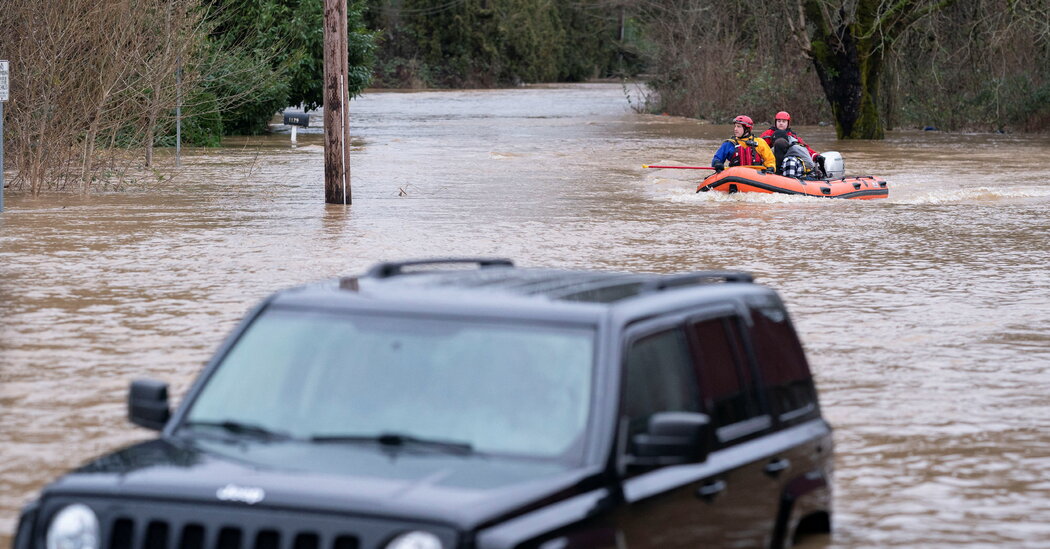Crucial routes through the Cascade Mountains remained closed on Sunday as responders assessed the damage.
Emergency workers in the Seattle area were assessing the damage on Sunday after torrential rain and heavy snowfall hit a large part of the region, making Washington’s largest city a virtual island. Seattle recorded two inches of rain on Thursday, its seventh-wettest January day on record, and last week ranked No. 5 on Seattle’s list of its wettest first week of January.
Hoquiam, on the western edge of the state; Olympia; and Quillayute, in Washington’s northwest corner, also saw some of their wettest days on record. Hoquiam on Thursday received about six inches of rain, its highest one-day total on record, and Rainier, southwest of Olympia, had 10 inches of rain, according to the National Weather Service.
Warning of “imminent flooding,” officials in the Skokomish Valley area, west of Seattle, on Thursday ordered residents to either evacuate or prepare to shelter in place for 72 hours.
Clearer skies came on Sunday, but some important roads remained closed. The Washington Emergency Management Division urged drivers to stay off closed roads, saying on Twitter late Saturday that “first responders continue rescuing people ignoring closed road signs.”
Other parts of the state also saw closures. Crucial routes that cut through the Cascade Mountains and connect the east and west sides of the state were closed for days because of heavy snowfall: Snoqualmie Pass, the main route through the mountains, was expected to reopen on Sunday, according to the state’s Department of Transportation. Blewett Pass was also set to reopen for freight travel, but Stevens and White Passes will take longer to clear, the agency said. It has been over a decade since all four passes were closed for an extended time, the agency said.
The road crew on Stevens Pass said on Sunday that there was a four-inch-thick “slab of ice” on the lanes that were cleared of snow.
The Pullman campus of Washington State University, in southeastern Washington, canceled classes on Monday and Tuesday to allow students on the other side of the state to return.
Areas in Central Washington, including Leavenworth, got around three feet of snow on Thursday and Friday, with some pockets getting four feet, which the city described as record-breaking in a statement. The mayor of Leavenworth on Friday declared a state of emergency and called in the National Guard.
The heavy snow and rain raised concerns of avalanches in the Cascade Mountains. The Seattle Fire Department shared a video on Twitter of a house that had slid off its foundation. Both people inside the house were rescued, but a pet dog was killed, the department said.
A 72-year-old man in Grays Harbor County, in the northwest part of the state, died in a torrential downpour on Friday after leaving to move his car to higher ground, according to The Associated Press.
In Lewis County, in southwestern Washington, home to Chehalis, the water was receding on Sunday, but “we definitely still have flooding,” said Austin Majors, public information specialist for the county. In that county alone, there had been at least 25 water rescues, he said.
Thousands in the state were without power on Friday and Saturday, but most outages appeared to have been resolved. Gov. Jay Inslee issued an emergency declaration on Friday that cited “hazardous driving conditions, flooding and extended road closures.”
Meteorologists attributed the weather to a warm front that had hovered above the area for an extended period, bringing with it several inches of rain.































